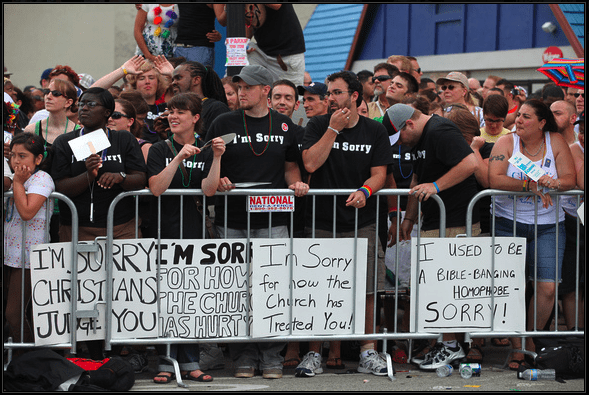During the 9th annual Pride Parade, Christians from different religious organizations publicly apologized to the members of the LGBT community last Dec. 5, 2015 at Baguio City.
The Pride Parade is a gay pride march organized by the Amianan Pride Council, a network of LGBT and ally organizations that organized Pride in Baguio and the Cordilleras this year.
The parade was attended by different human rights organizations and LGBT support groups and supporters.
According to outragemag.com, during the procession of the march, various Christians were publicly seen apologizing to the members of the LGBT community. They were also wearing T-shirts that said “I’m sorry” and holding signs and tarpaulins that said “I’m sorry for using the Bible to hurt you”, “God adores you”, and “We are here to apologize for the ways we as Christians have harmed the LGBT community” among others.
Outragemag.com also reported that the religious organizations that participated included the NCCP, the largest fellowship of mainline Protestant and non-Roman Catholic churches in the country, the Regional Ecumenical Council of the Cordillera, Episcopal Church in the Philippines, and the United Church of Christ in the Philippines (UCCP).
Similar occurrences
According to an article by winnipegfreepress.com, a group of Christians publicly apologized to participants of a gay pride parade in Winnipeg, Manitoba which is located in Canada last 2013.
The act was led by the Winnipeg I’m Sorry event which is part of an international I’m Sorry movement started by the Marin Foundation of Chicago, a non-profit group that works to build bridges between the LGBT community and the church.
The article also noted Jamie Arpin-Ricci, a pastor of the Little Flowers Church in Winnipeg, saying that the event was a way for Christians to apologize for what they did to the LGBT community.
“As Christians we have done wrong, and we want to say sorry,” he said. “This is one way of making an unqualified apology and publicly committing ourselves to do better.”
The article also stated that since a similar event which occurred during the Chicago Gay Pride Parade in 2010, which was also led by the same movement, the I’m Sorry campaign had expanded to Pride Parades in 20 other cities in the United States, England, Scotland, Guatemala and Canada.
A point of change
The occurrence in Baguio had garnered several positive responses from the Ateneo community. Hadji Balajadia, an openly gay member of the university’s Psychology department, believed that the event is symbolic.
“I think it’s symbolic of the role of the church in the psycho-spiritual growth of many LGBTs who are out and who intend to come out. It’s symbolic in the sense that while mainstream Christian churches are still not sold out to the homosexual lifestyle or orientation of the LGBTs, it is already a milestone that there are some quarters of the communities of the Christian circles and churches who admit to the role of discriminating.
“So to my mind it’s symbolic yet it mirrors genuine and authentic Christian values of inclusiveness, of neighborly love, of unconditional love,” he said.
Balajadia also said that the event’s importance played a role in breaking grounds.
“Christianity has to be relevant in the lives of these LGBT, so it’s very important that these gay-pride march has broken grounds for mutual understanding and dialogue, for mutual repentance.”
Members of the student body also expressed positive comments regarding the issue. John Ray ‘Janna’ Magbanua, a third year Chemical Engineering student and the president of the Knighting Gales Society of Davao, an organization composed of LGBT students, thought that the event was a point of realization for people.
“It’s a point of realization for [the religious]. I think that they came to realize that we are LGBT, and that most of us are really not bad people,” Magbanua said.
Members of the Christian community also viewed the event positively. Lunar Fayloga, the chair of the university’s Theology department, said the apologizing was a humble act on the part of the Christians.
“It is very consoling to know that Christians are apologizing. We just want to clarify this: If Christians are apologizing, it is a humble admittance that to some extent, they have not just hurt their gender orientation, but their very person,” he said.
Better ties between LGBT, Christians
Balajadia also thought that the event can open more doors for understanding.
“I’d like to believe that this opens the door to more dialogue and to more mutual understanding of the different positions of the institutions the LGBT represent and also of the Christian churches. [This matters] because a lot of the lesbians, gays, bisexuals, and transsexuals belong to Christian churches,” he said.
Fayloga also expressed that the affair sends a welcoming message to the LGBT.
“We are providing an atmosphere and a message that we welcome these people. At the end of the day, whether you are gay, lesbian or transsexual, you are still a child of God. That is our primary identity; you have feelings, you have rights, and you have dignity.
And when you start the discussion by looking at these people as persons, lumalawak ang mga puso natin para sa kanila at mas madali natin [silang] ipalapit sa simbahan. Whereas, if we look at these individuals and reduce them to discussions about [their genitals], we are closing our doors [to them], because more than them being lesbians and gays, they are persons,” he said.
Magbanua mentioned that the event can open the minds of people even more.
“Most of us (LGBT members) can’t deny that we are being discriminated due to the patriarchal society that dictates that men should be masculine, and women should be feminine.
“I think that it will enlighten the minds of others to study about gender and sex so that they can really understand who we are and that what we are is not a matter of choice, but a matter of identity that is already enshrined into us. We are just acting on what our hearts and minds say,” she said.

